Foreign relations of South Korea

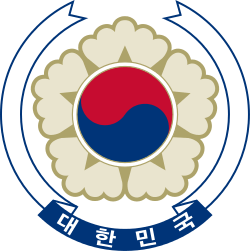 |
| This article is part of a series on the politics and government of South Korea |
| Constitution |
|
National Assembly
|
|
Judiciary
|
|
Politics portal |
The foreign relations of South Korea (officially the Republic of Korea) are South Korean relations with other governments.
South Korea maintains diplomatic relations with 190 countries. The country has also been a member of the United Nations since 1991, when it became a member state at the same time as North Korea. South Korea has also hosted major international events such as the 1988 Summer Olympics and the 2002 World Cup Soccer Tournament (co-hosted with Japan). Furthermore, South Korea will also be hosting the 2018 Winter Olympics which will take place in Pyeongchang.
South Korea is a member of the United Nations, WTO, OECD, ASEAN Plus Three, East Asia Summit (EAS), and G-20 major economies. It is also a founding member of Asia-Pacific Economic Cooperation (APEC) and the East Asia Summit.
On January 1, 2007, South Korean Foreign Minister Ban Ki-moon assumed the post of UN Secretary-General.
East Asia
Inter-Korean relations
Inter-Korean relations may be divided into five periods. The first stage was between 1972 and 1973; the second stage was Pyongyang's delivery of relief goods to South Korea after a typhoon caused devastating floods in 1984, and the third stage was the exchange of home visits and performing artists in 1985. The fourth stage, activated by Nordpolitik under Roh, was represented by expanding public and private contacts between the two Koreas. The fifth stage was improved following the 1997 election of Kim Dae-jung. His "Sunshine Policy" of engagement with North Korea set the stage for the historic June 2000 Inter-Korean summit.
The possibility of Korean reunification has remained a prominent topic. However, no peace treaty has yet been signed with the North. In June 2000, a historic first North-South summit took place, part of the South's continuing Sunshine Policy of engagement. Since then, regular contacts have led to a cautious thaw. Kim Dae-jung's "Sunshine Policy" of engagement with North Korea set the stage for the historic June 2000 Inter-Korean summit. President Kim was awarded the Nobel Peace Prize in 2000 for the policy.
With that policy, continued by the following administration of Roh Moo-hyun, economic ties between the two countries have increased, humanitarian aid has been sent to North Korea, and some divided families have been briefly reunited. Military ties remain fraught with tension, however, and in 2002 a brief naval skirmish left four South Korean sailors dead, leaving the future of the Sunshine policy uncertain. The North cut off talks but the South remained committed to the policy of reconciliation and relations began to thaw again. The resurgence of the nuclear issue two years later would again cast relations in doubt, but the South has sought to play the role of intermediary rather than antagonist, and economic ties at the time seemed to be growing again.
Despite the Sunshine Policy and efforts at reconciliation, the progress was complicated by North Korean missile tests in 1993, 1998, 2006 and 2009. As of early 2009, relationships between North and South Korea were very tense; North Korea had been reported to have deployed missiles,[1] ended its former agreements with South Korea,[2] and threatened South Korea and the United States not to interfere with a satellite launch it had planned.[3] As of 2009, North and South Korea are still opposed and share a heavily fortified border.[4]
On May 27, 2009, North Korea media declared that the armistice is no longer valid due to the South Korean government's pledge to "definitely join" the Proliferation Security Initiative. To further complicate and intensify strains between the two nations, the sinking of the South Korean warship Cheonan in March 2010, killing 46 seamen, is as of May 20, 2010 claimed by a team of researchers around the world[5] to have been caused by a North Korean torpedo, which the North denies. South Korea agreed with the findings from the research group and President Lee Myung-bak declared in May 2010 that Seoul would cut all trade with North Korea as part of measures primarily aimed at striking back at North Korea diplomatically and financially.[6] As a result of this, North Korea severed all ties and completely abrogated the previous pact of non aggression.[7]
In November 2010, Unification Ministry officially declared the Sunshine Policy a failure, thus bringing the policy to an end.[8][9] On November 23, 2010, North Korean artillery shelled Yeonpyeong with dozens of rounds at Yeonpyeong-ri and the surrounding area.[10]
Japan

The relation between South Korea and Japan has both political conflicts and economic intimacies. Examples of conflicts include the East sea naming dispute, visits by successive Japanese Prime Ministers to the Yasukuni Shrine, and the disputed ownership of Dokdo.
On January 18, 1952, The first president of South Korea Syngman Lee declared that the vicinity of Dokdo was a territory of South Korea (Syngman Lee line). Subsequently, some 3,000 Japanese fishermen who conducted fishery operations in this vicinity were captured. This incident, called the Dai Ichi Daihoumaru Ship case, strained relations between South Korea and Japan.
June 22, 1965, The president in South Korea Park Chung-hee concluded the Treaty on Basic Relations between Japan and the Republic of Korea. As a result, Japan considered South Korea to be the legitimate successor of the Korean peninsula.
South Korea's trade with Japan was US$892.1 million in 2008, with a surplus of nearly US$327.1 million on the Japanese side.[11] Japanese and South Korean firms often had interdependent relations, which gave Japan advantages in South Korea's growing market.
In 1996 FIFA announced that the two countries would jointly host the 2002 FIFA World Cup. The next few years would see leaders of both countries meet to warm relations in preparations for the games.[12] The year 2005 was designated as the "Japan-South Korea Friendship Year".
However, the Liancourt Rocks controversy erupted again when Japan's Shimane prefecture declared "Takeshima Day", inciting mass demonstrations in South Korea.[13]
People's Republic of China
Active South Korean-Chinese people-to-people contacts have been encouraged. Academics, journalists, and particularly families divided between South Korea and China were able to exchange visits freely in the late 1980s. Nearly 2 million ethnic Koreans, especially in the Yanbian Korean Autonomous Prefecture in China's Jilin Province, have interacted with South Koreans.
Trade between the two countries continued to increase nonetheless. Furthermore, China has attempted to mediate between North Korea and the United States and between North Korea and Japan and also initiated and promoted tripartite talks—between Pyongyang, Seoul, and Washington.
South Korea had long been an ally of the Republic of China. Diplomatic ties between Seoul and Taipei were nevertheless severed in 1992. Formal diplomatic relations were established between Seoul and Beijing on August 24, 1992.
In 2004, the PRC government began the Northeast Project. This sparked a massive uproar in South Korea when the project was widely publicized.[14]
After the KORUS FTA (United States-Korea Free Trade Agreement) was finalized on June 30, 2007, the Chinese government has immediately begun seeking an FTA agreement with South Korea. The FTA between Korea and China are under discussion. South Korea has been running a trade surplus with China, which hit a record US$32.5 billion in 2009.[15][16]
Republic of China
On 23 August 1992 the Republic of China government, by then only in control of the island of Taiwan and a few minor outlying areas, severed diplomatic relations with South Korea in advance of its announcement of formal recognition of the People's Republic of China based in Beijing. Yonhap News said in 2002 that since then, relations between the two governments have been "in a rut".[17]
Philippines
Since the establishment of diplomatic ties on 3 March 1949, the relationship between the Philippines and South Korea has flourished. The Philippines was one of the first countries that extended diplomatic recognition to South Korea or the Republic of Korea. This was cemented with the Philippine government’s deployment of the Philippine Expeditionary Force to Korea (PEFTOK) to help South Korea against the invasion of the communist North during the Korean War in the 1950s. After the war, the Philippines provided development assistance to South Korea and helped the country rebuild itself.
Since then, the Philippines’ relations with South Korea have evolved, with South Korea becoming one the Philippines’ most important bilateral partners aside from the US, China, and Japan. The Philippine government seeks to cultivate strategic ties with South Korea given its increasing presence in the country. In the coming years, the Philippines anticipates to benefit from exploring unprecedented opportunities from South Korea that shall contribute significantly to the country’s trade and economy, defense and security, and society and culture.
Russia

In the 1980s, South Korean President Roh Tae Woo's Nordpolitik and Mikhail Gorbachev's "New Thinking" were both attempts to reverse their nations' recent histories. Gorbachev had signaled Soviet interest in improving relations with all countries in the Asia-Pacific region, including South Korea, as explained in his July 1986 Vladivostok and August 1988 Krasnoyarsk speeches.
In initiating Nordpolitik, Roh's confidential foreign policy adviser was rumored to have visited Moscow to consult with Soviet policymakers. Kim Young Sam visited Moscow from June 2 to June 10, 1989, as the Kremlin announced that it would allow some 300,000 Soviet-Koreans who had been on the Soviet island of Sahkalin since the end of World War II to return permanently to South Korea. Moscow even arranged Kim's meeting with the North Korean ambassador to the Soviet Union. In June 1990, Roh held his first summit with President Gorbachev in San Francisco.
South Korea and USSR established diplomatic relations on September 30, 1990.This relation continued by Russia on December 27, 1991. Russian president Vladimir Putin visited Seoul in February 2001, while South Korean president Roh Moo-hyun visited Moscow in September 2004.[18][19]
South Korea is currently selecting its first astronaut, scheduled to board a Soyuz flight to the International Space Station in April 2008. South Korea plans the first domestic launch of a satellite in 2008, with Russian assistance. The aerospace institute is spending about 20 billion on the astronaut project, including Russian fees.[20]
Since the 1990s there has been greater trade and cooperation between the two nations. The total trade volume between South Korea and Russia in 2003 was 4.2 billion US dollars.[21]
Mongolia
Both countries established diplomatic relations on March 26, 1990. South Korea has an embassy in Ulan Bator.[22] Mongolia has an embassy in Seoul.[23]
United States
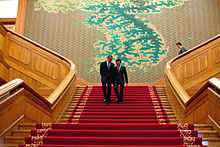
The United States engaged in the decolonization of Korea (mainly in the South, with the Soviet Union engaged in North Korea) from Japan after World War II. After three years of military administration by the United States, the South Korean government was established. Upon the onset of the Korean War, U.S. forces were sent to defend South Korea against invasion by North Korea and later China. Following the Armistice, South Korea and the U.S. agreed to a "Mutual Defense Treaty", under which an attack on either party in the Pacific area would summon a response from both.[24]
In 1968, South Korea obliged the mutual defense treaty, by sending a large combat troop contingent to support the United States in the Vietnam War. The U.S. Eighth Army, Seventh Air Force, and U.S. Naval Forces Korea are stationed in South Korea. The two nations have strong economic, diplomatic, and military ties, although they have at times disagreed with regard to policies towards North Korea, and with regard to some of South Korea's industrial activities that involve usage of rocket or nuclear technology. There had also been strong anti-American sentiment during certain periods, which has largely moderated in the modern day.[25]
Since the late 1980s, the country has instead sought to establish an American partnership, which has made the Seoul–Washington relationship subject to severe strains. Trade had become a serious source of friction between the two countries. In 1989, the United States was South Korea's largest and most important trading partner and South Korea was the seventh-largest market for United States goods and the second largest market for its agricultural products.
From Roh Tae-woo's administration to Roh Moo Hyun's administration, South Korea sought to establish an American partnership, which has made the Seoul–Washington relationship subject to some strains. In 2007, a free trade agreement known as the Republic of Korea-United States Free Trade Agreement (KORUS FTA) was reportedly signed between South Korea and the United States, but its formal implementation has been repeatedly delayed, pending further approval by the legislative bodies of the two countries.
The relations between the United States and South Korea have greatly strengthened under the Lee Myung-bak administration. At the 2009 G-20 London summit, U.S. President Barack Obama called South Korea "one of America's closest allies and greatest friends." [26]
However, Anti-American sentiment in Korea still exists; The United States' alleged role in the May 1980 Gwangju uprising was the single most pressing South Korean political issue of the 1980s. Even after a decade, Gwangju citizens and other Koreans still blamed the United States for its perceived involvement in the bloody uprising. In 2008, the protests against U.S. beef has been a center of a major discussion in this year.
European Union
The European Union (EU) and South Korea are important trading partners, having negotiated a free trade agreement for many years since South Korea was designated as a priority FTA partner in 2006. The free trade agreement has been approved in September 2010, following Italy's conditional withdrawal of its veto of the free trade agreement.[27] The compromise made by Italy was that free trade agreement would take provisional effect on July 1, 2011. South Korea is the EU's eighth largest trade partner, and the EU has become South Korea's second largest export destination. EU trade with South Korea exceeded €65 billion in 2008 and has enjoyed an annual average growth rate of 7.5% between 2004 and 2008.[28]
The EU has been the single largest foreign investor in South Korea since 1962, and accounted for almost 45% of all FDI inflows into Korea in 2006. Nevertheless, EU companies have significant problems accessing and operating in the South Korean market due to stringent standards and testing requirements for products and services often creating barriers to trade. Both in its regular bilateral contacts with South Korea and through its FTA with Korea, the EU is seeking to improve this situation.[28]
Diplomatic relations

Asia
| Country | Formal Relations Began | Notes |
|---|---|---|
| 1973-12-12 | See Afghanistan – South Korea relations
| |
| 1973-12-18 |
| |
| 1984-06-01 | See Brunei–South Korea relations
| |
| 1973-12-01 | See India – South Korea relations
| |
| 1973-09-17 | See Indonesia–South Korea relations
| |
| 1962-10-23 |
| |
| 1962-04-10 | See Israel–South Korea relations
| |
| 1992-01-28 | See Kazakhstan – South Korea relations
| |
| 1960-02-23(as Malaya) | See Malaysia–South Korea relations
| |
| 1974-05-15 |
| |
| 1983-11-01 | See Pakistan-South Korea relations | |
| 1949-03-03 | See Philippines–South Korea relations
| |
| 1962-10-16 |
| |
| 1975-08-08 |
| |
| 1977-11-14 |
| |
| 1957-03-08 |
| |
| 1958-10-09 | See South Korea – Thailand relations
| |
| 1992-12-22 |
|
Oceania
| Country | Formal Relations Began | Notes |
|---|---|---|
| 1961-10-01 |
| |
| 1962-03-01 |
| |
| 1970-10-01 | See Fiji – South Korea relations
|
Americas
Europe
| Country | Formal Relations Began | Notes |
|---|---|---|
| 1963-03-22 |
| |
| 1992-02-10 |
| |
| 1990-03-23 | See Bulgaria – South Korea relations
| |
| 1992-11-18 |
| |
| 1995-12-28 |
| |
| 1990-03-22 |
| |
| 1959-03-11[79] | See Denmark – South Korea relations
| |
| 1991-10-17 |
| |
| 1973-08-24 |
| |
| 1949-02-15 | See France – South Korea relations
| |
| 1955-12-01(as West Germany) | See Germany – South Korea relations
| |
| | 1961-04-05 |
|
| 1966-09-01 [86] |
| |
| 1989-02-01 | See Hungary–South Korea relations
| |
| 1983-10-01 |
| |
| 1956-11-24 | See Italy – South Korea relations
| |
| 1961-04-01 |
| |
| 1959-03-02 |
| |
| 1989-11-01 |
| |
| 1990-03-30 | See Romania – South Korea relations | |
| 1950-03-17 |
| |
| 1959-03-07 |
| |
| 1962-12-19 |
| |
| 1949-01-18 | See South Korea–United Kingdom relations
| |
| 1992-02-10 |
|
Africa
| Country | Formal Relations Began | Notes |
|---|---|---|
| 1963-09-05 | ||
| 1963-04-01 | ||
| 1990-06-16 |
| |
| 1961-07-23 |
Since 1966, South Korea has an Embassy in Abidjan | |
| 1995-04-13 | See Foreign relations of Egypt | |
| 1992-12-01 |
|
No diplomatic relations
South Korea does not currently have any diplomatic relations with the following nations.
There are also no diplomatic relations with several unrecognized territories:
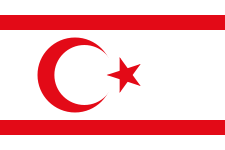 Northern Cyprus
Northern Cyprus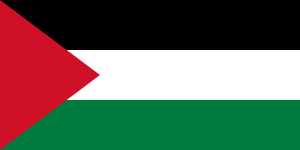 Palestinian Authority
Palestinian Authority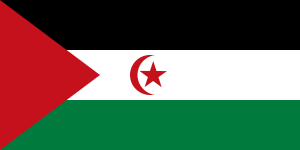 Sahrawi Arab Democratic Republic
Sahrawi Arab Democratic Republic Republic of China
Republic of China.svg.png) Transnistria
Transnistria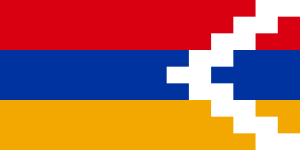 Nagorno-Karabakh Republic
Nagorno-Karabakh Republic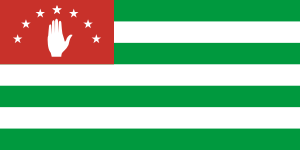 Abkhazia
Abkhazia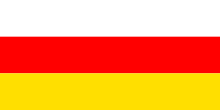 South Ossetia
South Ossetia
See also
- List of diplomatic missions in the Republic of Korea
- List of diplomatic missions of the Republic of Korea
- List of Korea-related topics
- Foreign relations of North Korea
- Government of South Korea
- June 15th North-South Joint Declaration
- South Korea-United States relations
References
- ↑ "N Korea 'deploying more missiles'". BBC News. 23 February 2009.
- ↑ "North Korea tears up agreements". BBC News. 30 January 2009. Retrieved 2009-03-08.
- ↑ "N Korea warning over 'satellite'". BBC News. 3 March 2009. Retrieved 2009-03-08.
- ↑ "CNN.com - Koreas agree to military hotline - Jun 4, 2004". Edition.cnn.com. 2004-06-04. Retrieved 2010-02-18.
- ↑ "Anger at North Korea over sinking". BBC News. 2010-05-20. Retrieved 2010-05-23.
- ↑ Clinton: Koreas security situation 'precarious', by Matthew Lee, Associated Press, 24-05-2010
- ↑ Text from North Korea statement, by Jonathan Thatcher, Reuters, 25-05-2010
- ↑ South Korea Formally Declares End to Sunshine Policy, Voice of America, 18 November 2010
- ↑ South Korea dumps Sunshine Policy with North, opts to go solo, International Business Times, 19 November 2010
- ↑ ((cite web|url=http://www.washingtontimes.com/news/2010/nov/23/n-korea-fires-artillery-s-korean-island-2-dead/))
- ↑ South Korean Ministry of Foreign Affairs and Trade about relations with Japan
- ↑ "South Korean leader bids farewell to Japanese emperor". CNN. 1998-10-09. p. 1. Retrieved 2007-01-19.
- ↑ Charles Scanlon (2005-03-14). "S Korean fury over island dispute". BBC. Retrieved 2007-01-19.
- ↑ Donga Monthly. http://news.naver.com/main/read.nhn?mode=LSD&mid=sec&sid1=101&oid=037&aid=0000006961
- ↑ "S Korea posts record-high trade surplus in 2009". 2010-01-14.
- ↑ South Korean Ministry of Foreign Affairs and Trade about relations with China
- ↑ "South Korea-Taiwan relations 'in a rut'". Yonhap News. 2002-08-21. Retrieved 2008-02-05.
- ↑ "Russia makes up lost ground with Korean proposals". Asia Times. 2001-02-27. Retrieved 2007-05-29.
- ↑ "South Korean president's visit to boost ties with Russia". People's Daily. 2004-09-24. Retrieved 2007-05-28.
- ↑ Cho, Kevin (2007-01-31). "South Korea Counts Down to First Astronaut With Aid From Russia". Bloomberg L.P. Retrieved 2007-05-29.
- ↑ "Russia ends WTO talks with S. Korea". People's Daily. 2004-09-22. Retrieved 2007-05-28.
- ↑ South Korean embassy in Ulan Bator
- ↑ South Korean Ministry of Foreign Affairs and Trade about relations with Mongolia
- ↑ "Mutual Defense Treaty Between the United States and the Republic of Korea; October 1, 1953". Yale Law School.
- ↑ Haesook Chae (2010). "South Korean Attitudes toward the ROK–U.S. Alliance: Group Analysis". Cambridge University Press.
- ↑ President Obama Vows Strengthened U.S.-South Korea Ties 2 Apr 2009. U.S. Embassy Seoul (Government of US)
- ↑ "EU agrees free trade deal with S.Korea". AFP. 2009-09-16.
- ↑ 28.0 28.1 "Bilateral Relations: Korea". European Commission.
- ↑ "Taliban say S.Korea paid over $20 mln ransom". Reuters. 2007-09-01.
- ↑ "Seoul would not talk about ransom". Naver News. 2007-09-06.
- ↑ Embassy of Bangladesh
- ↑ (Korean) 방글라데시 방문 때 비자 받아야
- ↑ South Korean Ministry of Foreign Affairs and Trade about relations with Bangladesh
- ↑ "Brunei-South Korea Relations". Ministry of Foreign Affairs and Trade (Brunei). Retrieved 15 February 2014.
- ↑ 35.0 35.1 IDSA publication
- ↑ South Korean Ministry of Foreign Affairs and Trade about relations with Indonesia
- ↑ Indonesia teams up with S. Korea to develop fighter jet
- ↑ "Junotane Korea". Retrieved 21 February 2015.
- ↑ "Error-2010-f3". Retrieved 21 February 2015.
- ↑ South Korean embassy in Tel Aviv
- ↑ Kazakhstan Korean Ministry of Foreign Affairs
- ↑ Ariffin, Roslan (2007-03-08). "Najib Dijangka Kukuhkan Hubungan Dua Hala M'sia-Korea Selatan (Najib plans strong Malaysia-South Korea bilateral relations)". Bernama. Retrieved 2007-05-04.
- ↑ South Korean Ministry of Foreign Affairs and Trade about relations with Malaysia
- ↑ South Korean Ministry of Foreign Affairs and Trade about relations with Nepal
- ↑ South Korean Ministry of Foreign Affairs and Trade about relations with Philippines
- ↑ South Korean Ministry of Foreign Affairs and Trade about relations with Saudi Arabia
- ↑ South Korean Ministry of Foreign Affairs and Trade about relations with Singapore
- ↑ South Korean Ministry of Foreign Affairs and Trade about relations with Sri Lanka
- ↑ South Korean Ministry of Foreign affairs and Trade about relations with Turkey
- ↑ (English) Official webpage of Embassy of the Republic of Korea in Thailand.
- ↑ (Korean) 재외공관 인사말
- ↑ South Korean Ministry of Foreign Affairs and Trade about relations with Vietnam
- ↑ http://aus-act.mofat.go.kr/eng/as/aus-act/main/index.jsp
- ↑ http://www.dailytelegraph.com.au/news/national/power-and-passion-as-julia-gillard-shows-her-seoul/story-e6freuzr-1226044695375
- ↑ "即日融資". Retrieved 21 February 2015.
- ↑ http://www.dfat.gov.au/geo/fs/rkor.pdf
- ↑ South Korean Ministry of Foreign Affairs and Trade about relations with Australia
- ↑ South Korean Ministry of Foreign Affairs and Trade about relations with New Zealand
- ↑ "Political relations", ROK embassy in Fiji
- ↑ "Embassy of South Korea in Fiji". Retrieved 21 February 2015.
- ↑ "Embassy of Fiji in South Korea". Retrieved 21 February 2015.
- ↑ Argentine embassy in Seoul
- ↑ 외교부. "외교부 홈페이지에 오신것을 환영합니다.". Retrieved 21 February 2015.
- ↑ South Korean Ministry of Foreign Affairs and Trade about relations with Brazil
- ↑ South Korean embassy in Bogotá
- ↑ 66.0 66.1 "Embassy of Paraguay in the Republic of Korea". Retrieved 21 February 2015.
- ↑ 외교부. "외교부 홈페이지에 오신것을 환영합니다.". Retrieved 21 February 2015.
- ↑ "《재외동포현황》 [Current Status of Overseas Compatriots]". South Korea: Ministry of Foreign Affairs and Trade. 2009. Retrieved 2009-05-21
- ↑ 외교부. "외교부 홈페이지에 오신것을 환영합니다.". Retrieved 21 February 2015.
- ↑ 외교부. "외교부 홈페이지에 오신것을 환영합니다.". Retrieved 21 February 2015.
- ↑ Austrian embassy in Seoul (in German and Korean only)
- ↑ South Korean embassy in Vienna
- ↑ "Bundespräsident Heinz Fischer zu Staatsbesuch in Südkorea eingetroffen" (in German). Federal President of the Republic of Austria. Retrieved 18 November 2008.
- ↑ "Äèïëîìàòè÷åñêèå ïðåäñòàâèòåëüñòâà Ðåñïóáëèêè Áåëàðóñü". Retrieved 21 February 2015.
- ↑ Bulgarian embassy in Seoul
- ↑ South Korean embassy in Sofia
- ↑ South Korean embassy in Prague
- ↑ "Czech embassy in Seoul". Retrieved 21 February 2015.
- ↑ South Korean embassy in Denmark
- ↑ Danish embassy in Seoul
- ↑ 외교부. "외교부 홈페이지에 오신것을 환영합니다.". Retrieved 21 February 2015.
- ↑ "덴마크 여왕, "한국은 역동이고 정이 많은 나라"". Daum 뉴스. Retrieved 21 February 2015.
- ↑ Estonian Ministry of Foreign Affairs about relations with South Korea
- ↑ Coopération politique - Ambassade de France en Corée
- ↑ 외교부. "외교부 홈페이지에 오신것을 환영합니다.". Retrieved 21 February 2015.
- ↑ "Pontificate of His Holiness Pope John Paul II - 2000 March 4."
- ↑ David M. Cheney. "Korea (Nunciature) [Catholic-Hierarchy]". Retrieved 21 February 2015.
- ↑ "Papal Address to South Korean Ambassador". ZENIT - The World Seen From Rome. Retrieved 21 February 2015.
- ↑ "Vatican Information Service News Archives - Monday, March 6, 2000: John Paul II Welcomes First Head of State from Korea." Refers to two visits in text.
- ↑ "Mass for the canonization of Korean martyrs, Homily of John Paul II, 6 May 1984". Retrieved 21 February 2015.
- ↑ VIS, Vatican Information Service. "VIS news - Holy See Press Office: Monday, March 06, 2000". Retrieved 21 February 2015.
- ↑ "Irish embassy in Seoul". Embassyofireland.or.kr. 2009-11-24. Retrieved 2010-10-24.
- ↑ "South Korean embassy in Dublin". Irl.mofat.go.kr. Retrieved 2010-10-24.
- ↑ "HONORARY CONSULATE of ROMANIA". Retrieved 21 February 2015.
- ↑ South Korean embassy in Bucharest
- ↑ South Korean Ministry of Foreign affairs and Trade about relations with Romania
- ↑ South Korean embassy in Bern
- ↑ 외교부. "외교부 홈페이지에 오신것을 환영합니다.". Retrieved 21 February 2015.
- ↑ "Посольство України в Республіці Корея". Retrieved 21 February 2015.
-
 This article incorporates public domain material from websites or documents of the Library of Congress Country Studies.
This article incorporates public domain material from websites or documents of the Library of Congress Country Studies.
Winter Olympics http://www.olympic.org/pyeongchang-2018-winter-olympics Winter Olympics http://news.bbc.co.uk/sport2/hi/other_sports/winter_sports/8753631.stm
External links
- Pride and Prejudice in South Korea's Foreign Policy
- Junotane Korea - Foreign Affairs
- Alon Levkowitz, The Republic of Korea and the Middle East: Economics, Diplomacy, and Security
| |||||||||||||||||||||||||||||||||||||
| ||||||||||||||